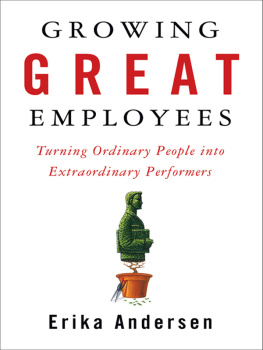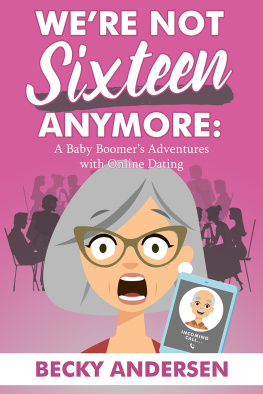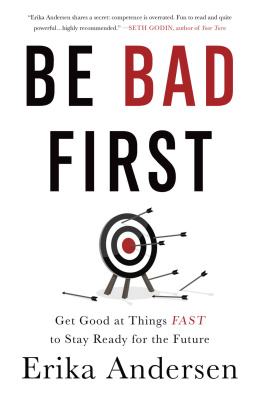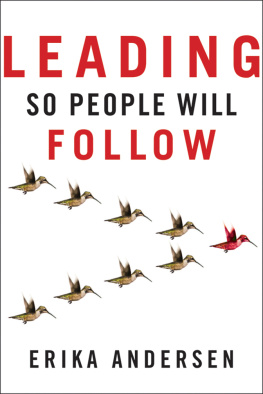First published by Bibliomotion, Inc.
All rights reserved. No part of this publication may be reproduced in any manner whatsoever without written permission from the publisher, except in the case of brief quotations embodied in critical articles or reviews.
Names: Andersen, Erika, author.
Title: Be bad first : get good at things fast to stay ready for the future /Erika Andersen.
Description: Brookline, MA : Bibliomotion, Inc., [2016] | Includes bibliographical references and index.
Identifiers: LCCN 2015038239| ISBN 9781629561080 (hardcover : alk. paper) | ISBN 9781629561097 (ebook) | ISBN 9781629561103 (enhanced ebook)
Subjects: LCSH: Organizational learning. | Organizational change. | Organizational effectiveness. | Performance.
Classification: LCC HD58.82 .A53 2016 | DDC 650.1dc23 LC record available at http://lccn.loc.gov/2015038239
Praise for
BE BAD FIRST
and Erika Andersen
Erika Andersen shares a secret: competence is overrated. Fun to read and quite powerful highly recommended.
Seth Godin, author of Your Turn
If the road to success is paved with mistakes well handled, then the journey of life is won by courageously choosing to stumble first in order to set distance records later. In Be Bad First, Erika Andersen lovingly guides us through the confidence-building steps necessary to master the part of growing up that doesnt benefit adults: a natural fear of failing to measure up.
Danny Meyer, CEO of Union Square Hospitality Group and author of Setting the Table: The Transforming Power of Hospitality in Business
In Be Bad First, Erika Andersen offers leadership strategies for the ever-changing business landscape that are essential for anyone trying to navigate it.
Doug Herzog, president, Viacom Music & Entertainment Group
I learned early in my career that whatever you are good at today will be old news tomorrow. As described in Be Bad First, responding well to this truth requires building specific mental skills. The book clearly shows you how to do that so you can stay in front of the pack with confidence no matter what. Read this book every year to sustain your success over time.
Dr. Marcia Reynolds, author of The Discomfort Zone: How Leaders Turn Difficult Conversations into Breakthroughs
Change is the new norm and with Be Bad First, Erika Andersen demonstrates how we all can be more agile and adaptive. She breaks down how to acquire new skills and knowledge quickly in order to thrive in todays fast-paced world.
Maryam Banikarim, global chief marketing officer, Hyatt Hotels Corporation
Erika Andersen exposes some of your darkest secrets, bringing them to light in a way that helps you realize its not only okay to Be Bad First, but absolutely necessary for the learning process that leads to sustainable performance.
Susan Fowler, author of Why Motivating People Doesnt Work and What Does
Whatever it is you have to learn or want to learn, Erikas latest book shows you the way to open yourself to becoming all you can be.
Dr. Jeff Tanner, dean, Strome College of Business, Old Dominion University
Were often held back from trying new things, in both our personal and professional lives, by the fear that were not going to be good at them. I love how Erika Andersens Be Bad First gives leaders the confidence to experiment in the spirit of innovationthen quickly move on to greatness.
Beth Comstock, vice chair, GE
To succeed in todays rapidly changing world, youve constantly got to think and act in brand-new ways. Erika offers a fresh approach in clear, practical terms to get to good or great, you cant be afraid to Be Bad First.
Bonnie Hammer, chairman, NBCUniversal Cable Entertainment Group
You are the kindest, bravest, truest man I know
M y client was clearly not happy.
I cant get my folks to think beyond what theyre doing now! he said, exasperated. At my inquiring look, he continued, I asked everyone on my senior team to come up with one big new ideasomething they thought could really move the business forward. And most of them just repeated back to me some variation of their existing goals. I dont know what to do to get them thinking differently.
A year into his new job as CEO of a media company just coming out of bankruptcy, he had already made sweeping changes: he completely revamped the senior team, spun off an underperforming division, and invested in a small part of the business where he saw future potential. His big frustration? Figuring out how to get his folks to follow him into the unknown, to be willing to experiment, to try new things.
I imagine theyre worried about being badand having you see them as bad, I replied.
He seemed puzzled.
These people are good at their jobs, I went on, and they believe youve hired them or kept them on because theyre good at their jobs. They feel highly competent, even expert, and that makes them confident and comfortableespecially in this organization thats undergoing so much change. I leaned forward. And now youre asking them to learn brand-new ways of operating, to suggest things theyve never tried, to, perhaps, fail publicly. Youre asking themthese middle-aged expertsto risk going back to being novices to look dumb, to make mistakes, to not know how to do things. And its enormously uncomfortable for them. Theyre resisting it by focusing on what they know theyre good at and what they feel comfortable doing.
His face cleared. This particular executive, unlike most people, is okay with the discomfort of trying new things in public. Making mistakes and having to ask I-dont-know-what-that-means kinds of questions usually doesnt bother him much.
So I need to encourage them to get comfortable with being uncomfortable, he said, starting to smile.
Exactly, I said. You need to let them know that not having everything perfectly mapped out is okay, and that you expect that some of their new ideas wont work. Most importantly, they have to know that you truly see trial and error as an inevitable part of breaking new ground. Its your responsibility to support them in becoming as comfortable as possible with the terribly awkward reality of exploring and understanding new ideas and new skills. You have to knowand let them know that you knowthat to get good at anything thats new to you, you have to be willing to be bad at it first.
And thus the title of this book. You may get tired of me saying this over and over again, but its the core of what well be talking and thinking about throughout this book, and its a surprisingly unrecognized aspect of modern life. Because each one of us today is faced, moment to moment, with an overwhelming flood of information and possibilities that are brand new to us, we have to learn to be okay with being continuously uncomfortable in a way that no one in previous generations has had to do. As my client so wisely said it, we have to learn to be comfortable with being uncomfortable.
Before You Decide This Is Another Book About Failure
I feel compelled to take a pause and do a bit of mind reading here. I believe you may, right at this moment, be thinking,














